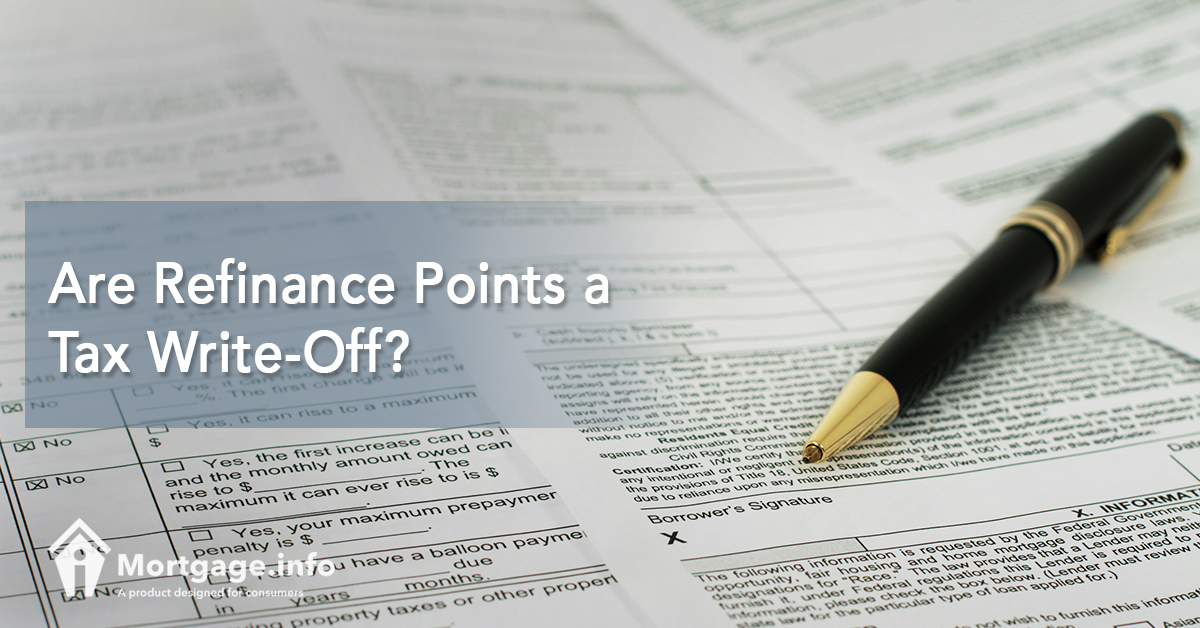One of the most common tax write-offs Americans think of is their mortgage interest. It is a great incentive to own a home when you can write-off thousands of dollars in interest every year. There are, however, other costs that relate to your mortgage that you can deduct as well. One of the largest is the ability to deduct points that you pay for a mortgage. This does not include strictly purchase loans – refinance points are also often tax deductible.
What are Refinance Points?
First, let’s look at the definition of refinance points. One point equals one percent of your loan amount. They are not a required charge; some lenders charge them and some do not. Lenders charge these points when they feel they need to make a larger profit on your loan. Typically, this occurs when your loan requires more extensive work to get it approved or when you are riskier than the average borrower. Lenders willing to take the extra risk often charge these points in order to make up for the risk, in the event that you default in the future.
When are Refinance Points Deductible?
Just as is the case with a home purchase, there are specific guidelines you must follow in order to deduct refinance points on your taxes. Generally, these points serve as a deduction over the life of the loan, which means you deduct a small portion of the amount you paid each year. However, if you used the money from your refinance in order to improve your home, you might be able to deduct a portion or all of the points at once. In order to qualify, the following guidelines must pertain to you:
- The refinance must be for your current, primary residence
- The points you paid must be the norm for your area
- You must claim your income the year you make it (cash method for income reporting)
- The lender cannot substitute points for normal charges, such as underwriting, appraisals, etc.…
Figuring out the Amount you can Deduct
So now that things are complicated by saying that you can deduct a portion of the points you pay right away and the other portion over the life of the loan, how do you know which is which? Generally, it works like this:
- You can deduct the points that pertain to the amount of money you took out over and above the current outstanding principal balance of your loan. This is the money you take out to make changes to your home. These points are deductible right away.
- Any points that pertain to the current outstanding principal balance can only be deducted at a fraction of its value. For example, if you took out a 30-year loan, you can only deduct 1/30th of the points each year until the loan is paid off.
Your lender can help you figure out which portion of the refinance points pertains to the original mortgage and which pertain to the portion used for fixing up your home.
How to Find your Refinance Points
You might not even know the exact amount of refinance points you paid on your new loan. Luckily, they are easy to find on your own or with the help of your lender. Your lender will send you a 1098 at tax time, which details the specifics of your loan, including the amount of points you paid. You can find them in Box 2. If you do not receive a 1098 or want to know sooner how much you paid, you can find the amount on your HUD-1 Settlement Statement. This statement shows everything you paid at the closing, including the points you paid on the loan.
Talk to your Tax Professional
Just like any other tax issue, you should always consult with your tax professional to determine what is right for your situation. No two tax situations are identical, even when it comes to deducting refinance points. If you paid points, chances are you can deduct them in some shape or form. Even if you are ineligible to deduct the entire amount at once, every dollar helps when it comes to tax time, so even deducting a small fraction of the points you paid can help your tax liability in the long run.
Remember that you can always negotiate the amount of points you pay with a lender. You are not obligated to pay them in order to get a refinance loan. If you shop around, you can see what the normal rate is for your area and your personal situation. If you do not wish to pay points, you can always negotiate with the lender to get a more affordable solution. Sometimes lenders can forgo the points by increasing your interest rate slightly. If you do not plan on staying in the home for the long-term, this could be the more plausible solution for you. In order to figure it out, get quotes for your refinance with points and without to see which situation will benefit you the most in the long run.

